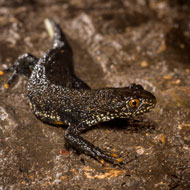
ZSL working to prevent Bsal fungus from infecting wild populations
Conservationists are calling on private amphibian traders to enforce strict biosecurity measures to protect the UK’s wild newt population against a deadly flesh-eating fungus.
The call from researchers at the Zoological Society London (ZSL) comes after a nationwide investigation found that the UK’s wild newt populations appear free of Batrachochytrium salamandrivorans (Bsal), known to be prevalent in privately-owned amphibians across Western Europe.
Conducted in partnership with the University of Exeter and the Amphibian and Reptile Groups of the UK, the study is published in the journal Scientific Reports.
Professor Andrew Cunningham, deputy director of science at ZSL and lead author on the paper said: “Identifying potential wildlife health risks before they develop is crucial to protecting species from the potentially devastating impacts of disease.
“Having identified that Bsal appears to be absent from wild newts in the UK, we now need to ensure effective biosecurity policies governing the trade of amphibians into the UK are in place, including adequate quarantine and testing of imported amphibians.”
In the study, researchers combined data gathered from skin swabbing more than 2,400 wild newts in ponds across the UK, along with data from newt deaths reported to ZSL’s Garden Wildlife Health project. The results of the investigations revealed Bsal was not present in the samples collected.
But in 2010 the fungus was responsible for a 99 per cent decline in a monitored population of fire salamanders in the Netherlands, with population declines expanding into Belgium and Germany. The fungus led to the extinction of local populations within months of being introduced.
Dr Becki Lawson, Senior Research Fellow at ZSL’s Institute of Zoology said: “We know that infection with Bsal fungus is widespread in captive amphibians in the UK, therefore amphibian owners must take steps to avoid any direct or indirect contact between wild and pet newts, by keeping animals indoors and disinfecting equipment and tanks thoroughly. These actions will help to safeguard the health of both wild and captive amphibians”.
“ZSL’s Garden Wildlife Health Project monitors the health of the wildlife found in British gardens, through collating public reports of ill or deceased animals and undertaking subsequent post-mortem examinations. Reports from the public provided crucial information for this study.”
Image (C) ZSL/Julian Smart.



 The Animal and Plant Health Agency (APHA) has updated its online reporting service for dead wild birds.
The Animal and Plant Health Agency (APHA) has updated its online reporting service for dead wild birds.